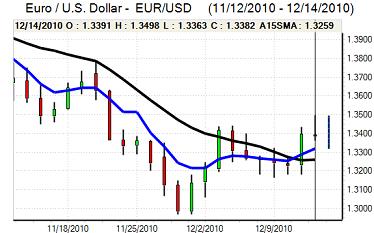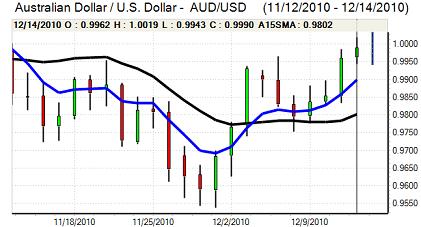EUR/USD
The Euro sustained a strong tone in Europe on Tuesday and pushed to challenge resistance levels near 1.3480 against the US currency. The German economic data maintained a firm tone with a ZEW business confidence index rise to 4.3 for December from 1.8.
The Euro was unable to sustain the gains as it remained dogged by structural fears. There was a report that Standard & Poor’s could cut the Belgian credit ratings which reinforced market fears over the contagion risk. There will still be major reservations over investment inflows into the region which will curb Euro support and there is still the risk that confidence will deteriorate further.
The US retail sales data was stronger than expected with a 0.8% headline increase for November following a revised 1.7% gain previously while there was an underlying 1.2% increase. The data will reinforce expectations of a firmer trend in consumer spending, especially with some evidence of looser credit conditions. The producer prices data was also stronger than expected with a 0.8% monthly increase with a 0.3% core increase and bond yields rose following the data.
The Federal Reserve left interest rates on hold in the 0.00-0.25% range and it also maintained its commitment to the US$600bn bond-buying programme. Although the statement was slightly more upbeat surrounding growth prospects, it also stated that the performance was not sufficient to cut unemployment. The dollar gained some relief from the unchanged policy, but the statement was still generally dovish which will limit potential support and it consolidated near 1.3350.

Source: VantagePoint Intermarket Analysis Software
Call now and you will be provided with FREE recent forecasts
that are up to 86% accurate * 800-732-5407
If you would rather have the recent forecasts sent to you, please go here
Yen
The dollar remained under pressure in Europe on Tuesday and retreated to test support near 82.80, but then recovered strongly and pushed to highs near 83.85 in Asia on Wednesday. The US currency gained support on yield grounds following the better than expected US economic data as 10-year US bond yields rose to a fresh six-month high of 3.50%. The yen also lost some support as risk appetite was generally firm.
Domestically, the headline Tankan business confidence index rose fell to 5 for the fourth quarter from a reading of 8 previously and this was the first decline for two years, although it was slightly better than expected. The data will certainly maintain unease over economic trends, but an early response from the Bank of Japan looks unlikely and the yen is still gaining important protective support from a lack of Euro and dollar confidence.
Sterling
The UK consumer inflation rate was higher than expected with the headline rate rising to a six-month high of 3.3% from 3.2% previously, contrary to expectations of a small decline. The retail prices index also rose to 4.7% from 4.5% previously.
Bank of England MPC member Sentence maintained his call for higher interest rates but Sterling failed to sustain the initial advance. Underlying confidence in the economy remains fragile amid dual fears surrounding the economy. There are fears that growth will slow sharply at the beginning of next year as tax increases take effect and there are also fears that the Bank of England will risk losing control of inflation given the need to support demand.
Sterling retreated to lows below 1.5750 against the dollar, undermined to an important extent by the wider dollar recovery, while the Euro approached resistance close to 0.85.
Swiss franc
The dollar was unable to regain the 0.97 level against the franc on Tuesday and retreated to a fresh 1-month low below 0.96 despite a wider recovery on the crosses. The Swiss currency continued to trade with a very firm bias and pushed to 1.2830 against the Euro, close to the record highs seen in September with only a partial correction on Wednesday.
The National Bank meeting will be watched closely on Thursday and any increase in interest rates would trigger a renewed round of franc buying. It looks more likely that rates will be left on hold, especially given the bank’s concerns over currency strength. There will also be pressure on the central bank to prevent further franc appreciation given the potential damage to exports.

Source: VantagePoint Intermarket Analysis Software
Call now and you will be provided with FREE recent forecasts
that are up to 86% accurate * 800-732-5407
If you would rather have the recent forecasts sent to you, please go here
Australian dollar
The Australian dollar continued to challenge parity on Tuesday and strengthened to a high around 1.0025 as the US currency remained on the defensive and commodity prices rose.
The Australian currency should gain some support from expectations that the Chinese central bank will be less aggressive towards interest rate hikes, but there are still important risks surrounding the global economy and confidence in domestic conditions is also liable to erode further. The currency retreated back to the 0.9950 area despite solid buying support on dips.



